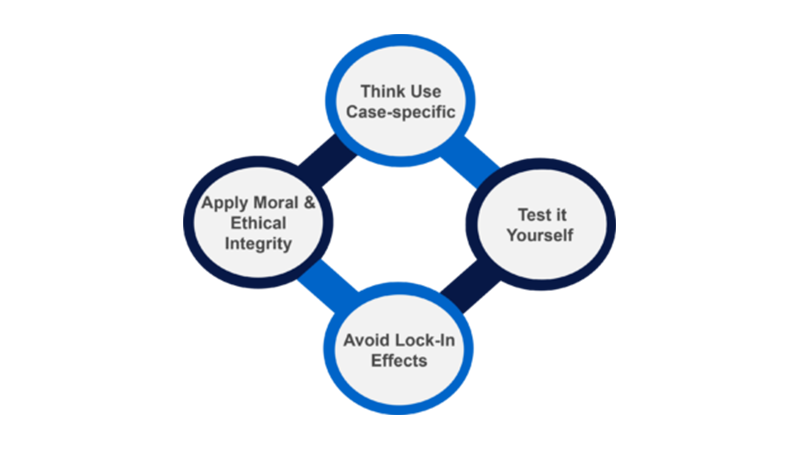No LinkedIn post without a mention of ChatGPT or now GPT-4, which OpenAI presented on the 14th of March. From a technology point of view, this AI platform is a breakthrough. However, as a leader, you should not be blinded by the hype. We have compiled four rules to use it effectively and wisely.
Figure 1
/ 4 Ways to Move from Hype to Impact

Source: bluegain Analysis [2024]

- Think Use Case-specific – Use cases are the ultimate currency of every digital transformation. In this sense, step away from the technology to the use cases. A use case typically integrates a combination of various technologies and data from various sources and translates it into business impact at scale, AI being one important but typically not the only one. GPT-4 contribution has helped to turn applications for certain problems from impossible to possible. Such AI-enabled applications are already out there and start affecting us in our life (e.g.: Co-piloting us at our daily work, voice interface for General Motors, or AI-supported code completion for programmers). Instead of technology-inside-out, start your journey on a use-case level.
- Test it Yourself – There is a lot of talk on LinkedIn and the media and that is good to get a brought picture, but nothing beats testing for yourself. All of us need to be AI-informed citizens. So, if you have not tested GPT-4 or ChatGPT yet, spend a few minutes on testing the capabilities and its limitations (link to Chat GPT). Get aware of the potential productivity boost for yourself. Understand the limitations, e.g. I found that using DeepL (translating back and forth) helps often to simplify long convoluted sentences better than ChatGPT. In your company, spread the word that many leverage the technology keeping the potential impact on the experience of your customers as a guideline.
- Avoid Lock-In Effects – Did you know that Google announced its own large language model API for companies to integrate, or that Meta released its version (LLaMA) for free? Others will release comparable products, too. OpenAI will have enough competition and competition drives the prices down. Until the market has decided for a “dominant design”, make sure that you do not lock yourself in too early. We have seen this with data platforms like Palantir, where a lock-in effect hinders you to change platforms because you do not get to the Python code any longer. So, it might be very compelling to jump on the very loud, fast-moving GPT-4 train but do not let a hype fast-track your due diligence and neglect the business risk of a lock-in early on.
- Apply Moral & Ethical Integrity – In the intelligent age, organizations will win in the long-term when their leadership is based on a moral and ethical foundation – something only humans can provide. The European Commission’s AI and the recent German Ethics Council’ opinion “Humans and Machines – Challenges of Artificial Intelligence” point in this direction. The broader application of such standards will reduce the uncertainty in society and markets regarding the dark uses of AI, however, over-regulation could limit the innovation power and result in a substantial competitive disadvantage. More important is that European leaders should join forces to find ways for the conscious handling of social, cultural, and ethical dilemmas and accelerate the AI ethics movement worldwide. This is a moral and ethical obligation.
In conclusion, embracing a broad understanding of AI’s potential and limitations helps maximize its benefits, while adhering to ethical standards ensures responsible usage that aligns with societal values. By integrating AI thoughtfully and ethically, organizations can drive impactful, sustainable transformation.
/ ABOUT THE AUTHOR
- Dr. Carsten Linz is the CEO and Founder of bluegain. Formerly Group Digital Officer at BASF and Business Development Officer at SAP, he is known for building €100 million businesses and leading large-scale transformations affecting 60,000+ employees. He is represented on various boards including Shareability’s Technology & Innovation Committee and Social Impact. A member of the World Economic Forum’s Expert Network, Dr. Linz is also author of renowned books and articles who shares his expertise in executive programs at top business schools around the world.
/ DOWNLOAD WHITEPAPER
Empowering you with knowledge is our priority. Explore our collection of well-thought-out whitepapers available for download. Should you have any questions or wish to explore further, our team is here to assist you.
download


 back to Article
back to Article
/ The latest insights in your mailbox
As Executive, stay up-to-date on the latest leadership perspectives on digital, sustainability, and business model transformation and get all the latest news, white papers and industry insights delivered straight to your inbox…
Subscribe to our #NEWLEADERSHIP BRIEFING for monthly insights for transformational leaders, who proactively shape the future instead of solely responding to it.

